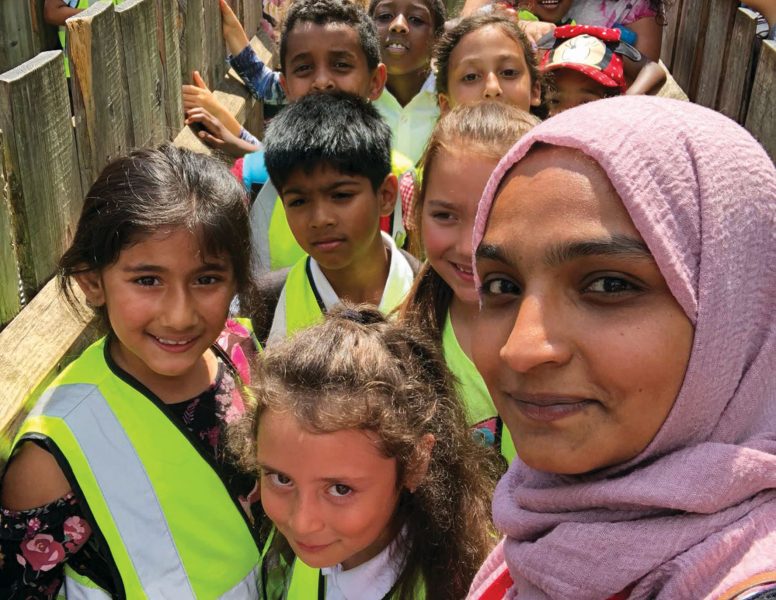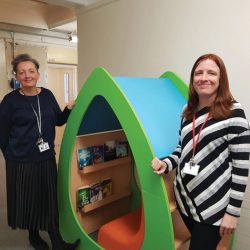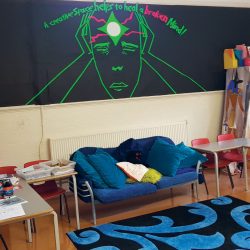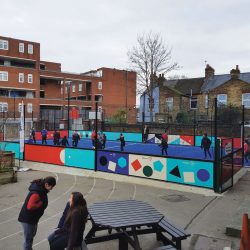Seven Sisters Primary – where the emotional needs of children come first
Richard Rieser meets staff and pupils at the South Tottenham Primary School in London.

“At Seven Sisters Primary School and Centre, we provide child-centred learning within a stable, consistent and inspiring environment. Our children become independent, creative, innovative and reflective members of society. We nurture and support all abilities. As an inclusive school, we recognise the uniqueness and aspirations of all members of our school family. Through an inspirational curriculum, our children are empowered to exceed all expectations and become lifelong achievers with a love of learning. Every member of our school community is valued, listened to, supported and given skills and opportunities to develop and be the very best they can be. We make a difference to the lives of our community and prepare our children to be part of an ever-changing world.” Emma Murray, Headteacher.
I visited Seven Sisters Primary School because I had heard they were doing innovative things to include pupils, especially those from severely socially disadvantaged backgrounds and those with social, emotional and mental health issues. The school is located down a quiet back street near Seven Sisters Road in South Tottenham, a very deprived part of Haringey in North London.
OFSTED (2016) describes the school as larger than most primary schools with currently 482 pupils aged 3 to 11 years (two forms of entry with a nursery and a children’s centre, mainly in a 1912 building). The majority of pupils are from minority ethnic groups. They are mainly from Turkish, Caribbean and Black African heritages. The proportion speaking English as an additional language is above average (81% E2L with 35 languages spoken at the school). Mobility is also above average (32%): 36 pupils were new to the school in the autumn term, over and above their regular intake. There is much temporary housing in the area and the catchment is on the edge of a major regeneration scheme. Secondly, families are suffering from the changes in benefits, they cannot afford to pay their rent. In the last year the number eligible for free school meals has come down from 60% to 38% (National Average 14%) but 61% count towards the funding as they were on free school meals in the last six years. This affects the amount of Pupil Premium the school gets, which it has carefully used to address the impact of disadvantage on pupils and families. Violence, drugs and abuse are part of many children’s experience. So Emma Murray, Headteacher, when she came to the school in 2015 was determined to prioritise with her initiatives and staff development to focus on emotional development.
I heard from Emma and Tara Welch (Assistant Head, Inclusion) that the school is developing an approach focused on the pastoral, reasoning that children who do not feel safe or lack emotional attachment are not in a position to learn or often even to stay in the classroom. The priority has been to build up the capacity of the school with innovative approaches using any funding available from different sources.

The pastoral team includes Tara Welch, Sam the SENCO, and a health mentor, Philippe, bought in five days per week from the Evolve Project Hero (www.evolvesi.com/project-hero/) and paid for out of sports premium money. This is the third year of Evolve’s involvement in the school and it has led to a shift to viewing the development of emotional intelligence and wellbeing as crucial. The pastoral team meet every week, pick up on referrals from class teachers and oversee the direction of travel. Also part of this team are Donna, leading on child and family intervention, who has been at the school over 20 years and knows the families and the area very well, having previously led on drugs education; Kate who is the designated safeguard lead dealing with child protection issues; Claire who was outreach worker from the children’s centre which has been de-designated – she is now reaching into the community for Early Years extended services for the under 5s and families, and running Stay and Play and parent workshops; and Billy who is the therapeutic /wellbeing practitioner and mainly works with a range of younger children to understand themselves with different therapies. There is also Alkan, a TA, an art specialist who works on drawing/talking stories for individuals for twelve weekly sessions addressing trauma and attachment. There are two counsellors (from the Tavistock and Hope for Tottenham) who each work with five children for one day a week; Reion is a sports instructor specialising in developing social skills through sport, working on self-esteem issues with a group of boys from Black African/Caribbean backgrounds. The school also has access to a speech and language therapist.
The school use the Adverse Childhood Experience (ACE) tracking tool based on trauma and disadvantage, developed by Emma. Years 1-6 are tracked against the 44 possible characteristics by true or false answers, eg child in care system, child has SEND, child is homeless, child abused, child in family with substance abuse, child speaks little or no English. Four or more true answers puts the child at risk. In the autumn of 2018, 88 children (25% of the roll) scored four or more and were judged at risk. This is then used to channel children into the different supports and therapies mentioned above.
The school is concerned about children’s cognitive development, now measuring this with an app – My Cognition. The school is using programmes they have developed over 40 hours per pupil to repair cognitive development impaired by trauma. Latest theories on neuroplasticity show this can be effective. From January 2019 the school are working on a cutting edge project funded by the NHS and linked to ‘Stronger Brains’ based in Australia, aimed at developing mental wellbeing. Twelve children will work for twelve weeks in a room identified as the Engine Room on mindfulness, meditation, brain training, yoga and other interventions. The aim is that this group of children will understand how their brain works and their anger and get back on track.

Going round the school it was clear there was a lot of space with old classrooms turned into intervention rooms for Years 5 & 6, Years 3 & 4 and Years 1 & 2, staffed by Higher Level TAs and an extra intervention teacher bought out of Pupil Premium; there was a therapeutic suite, the Engine Room, a sensory/quiet room, library and music room, as well as a separate room for lunchtime and after school clubs. In the corridors were reading booths where children could go in twos or threes to read.
Overall there are 40 staff working directly with children as well as another 20 clerical, meals, cleaning and site staff. These interventions are bearing fruit in the very low exclusions and the great progress the children make from when they first come to school on attainment and meeting expectations for a ‘Good’ school. The aim is to increase outcomes once a firm emotional stability has been created amongst the children.
The imaginative way the Pupil Premium has been used was interesting. Of the £270,600 for 2018/19 the following were bought in to enhance inclusion in the school, £38,376 for Child and Family Mentor, £86,636 for two specialist teachers in Year 2 and 6, £34,829 for targeted interventions (therapies), £40,829 for Early Years Extended Lead, £12,000 to allow all children to go on residential and day trips, £12,000 for music tuition for all Year 4 and targeted Year 5, £45,000 for Counselling, £11,466 for a free breakfast club and £12,000 for Ipads.

The school in recent years has changed its Behaviour Policy to a Positive Relations Policy based on the idea that behaviour is always communication and therefore adults must build positive relations with children, not shout or shame or make them feel worthless. The children deserve to be happy. There are lots of positive rewards and if necessary negative sanctions, but always in the context of trying to get the children to understand their behaviour. There is also room for reasonable adjustments for those children that don’t respond to the standard rewards and sanctions with an emphasis on de-escalation rather than confrontation.
Children with identified SEND include 49 on SEN Support, 8 with EHC Plans and 3 more in the pipeline. In recent years, the excellent Early Years facilities and staff have been getting a reputation for working with non-verbal children on the autistic spectrum. The school also strongly supports staff training and development.
The school mobilises resources in the community to improve the school environment. I saw girls and boys playing football together on the new mini astroturf pitch in the playground for which they fundraised last summer. See ‘Follow our Dreams’ a music video used in the campaign:
I came away from my visit impressed and humbled that despite tight budgets and a difficult intake here was a school imbued with an inclusive and child friendly ethos making a real difference to the lives of children and their families (who also get some parenting and language classes at the school) and living up to the school values and motto: “Empowering Learners; Unlocking the Future”. The school values are clearly understood and shared by every member of the school community and are at the heart of everything the school does. I saw ample evidence of this on my visit to the school on 11th December 2018.
Richard Rieser
![ALLFIE [logo]](https://www.allfie.org.uk/wp-content/themes/allfie-base-theme/assets/img/allfie-logo-original.svg)



